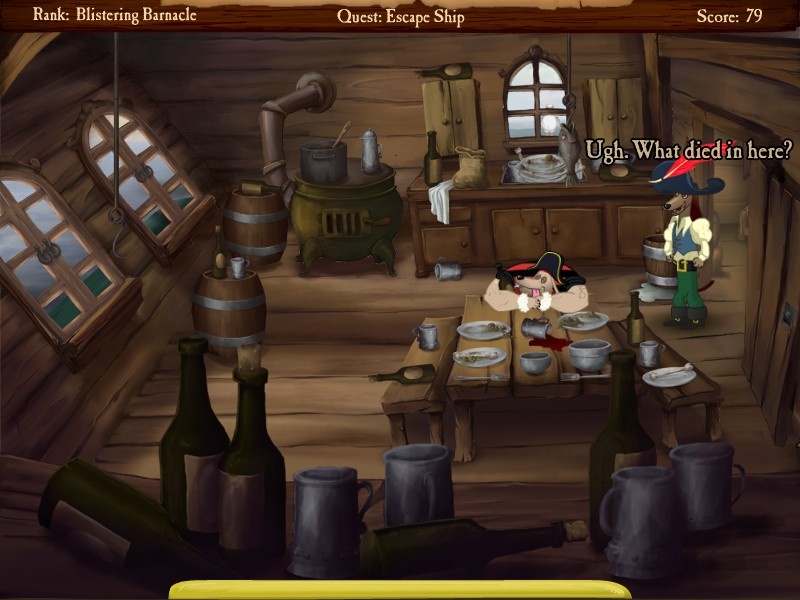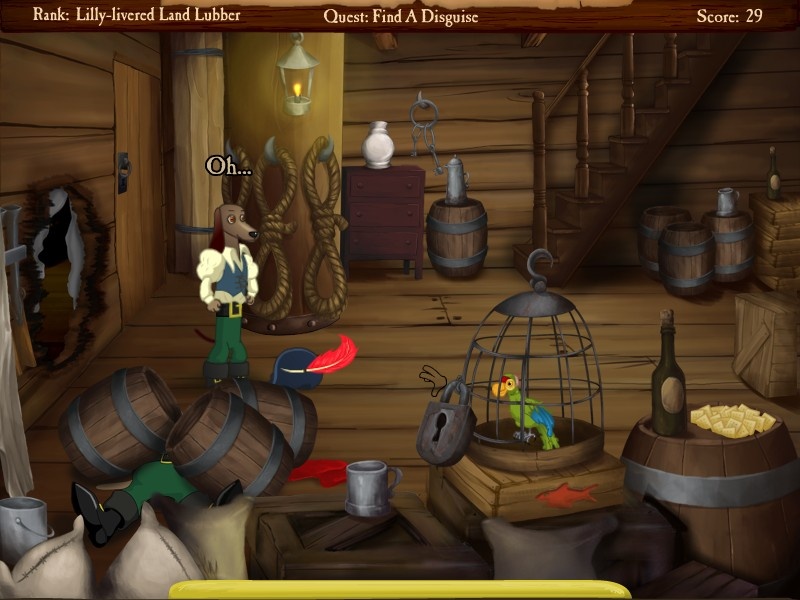Gaius James Rover is a polite dachshund with an affinity for Earl Grey tea and the unfortunate talent of attracting drunken pirates, who insist on plundering his ship and forcing him to cook delicious 17th-century salads. Luckily, James' anthropomorphized charm and knack for inductive logic turn Jolly Rover into a highly enjoyable 2D point-and-click adventure, one that successfully marries a great cast of characters with an engaging story and generally satisfying puzzles.

After escaping from indentured servitude on an enemy pirate ship, James finds himself tangled in a series of mysterious swashbuckling quests that involve lost treasure, family secrets, a toothless old man, a tribe of lady-dog pirates, a waterfall, some mangoes, and love--but not necessarily in that order. To find his stolen cargo and fulfill his lifelong dream of juggling balls, James must traverse a series of islands and solve an assortment of puzzles all while learning about the magic ways of "pirate voodoo," which proves useful in situations where he must do things like scare beasts or heat cauldrons to make jam. The game's story is engaging and easy to follow; it doesn't take long to understand what makes James tick. And it doesn't take long to understand why he doesn't tell people his first name is really Gaius or why he doesn't drink rum before sunset. He is a fun character to play, particularly if you're the sort of person who can appreciate a good pun when you hear one. The rest of the cast of Jolly Rover is just as colourful and enjoyable to listen to, from the drunken ramblings of loose-lipped pirates to the dulcet tones of hot bitches--a term that means "sexy female pirate dogs" here. The dialogue is biting and often features astute observations about such cerebral things as the meaning of life and why dogs chase balls. The game's soundtrack also adds charm and atmosphere to the adventure with its musically diverse mix of toe-tapping sea shanties, orchestral arrangements, woodwind ensembles, squawking parrots, and renditions of "Ahoy there, matey!"
There's a lot more to Jolly Rover than just dog puns, though. While most of your time is spent talking to other characters, collecting items, and solving puzzles, there's also a big emphasis on doggedness. The game rewards you for paying close attention to detail when examining items, with some items serving different purposes according to your situation. So, for example, an oily rag may serve one purpose in one scenario, but it may also be used again in a completely different way in another scene, which certainly keeps things interesting. There's also an unobtrusive hint system in place should you need it: James keeps a parrot named Juan, who dishes out a series of clues when bribed with crackers. The first hint is free (and highly cryptic), while the rest require one cracker each (and, thus, become less and less obscure). The best thing about this system is that experienced players don't even have to know it's there, or if they do get into a spot of trouble, they can safely opt for the free hint without suffering the shame of having the entire puzzle spoiled.
The puzzles themselves are inventory-based problems that can be solved in a straightforward way and don't require you to backtrack. The problem here is that most of the puzzles are too easy and become quite repetitive after a while. You don't have a lot of free range when it comes to interacting with your environment, meaning you only ever have to solve a problem with a few number of items so there will be little to no room for experimentation or good bouts of strategic thinking, which can be disappointing. More items to work with could have also made it harder to work out what fits together in exactly the right way, adding to both the longevity of the game and the complexity of its puzzles. That said, there are a few instances where the puzzle-solving breaks away from this pattern and becomes interesting. The first is with the aforementioned "pirate voodoo," a series of problems where you will have to use pen and paper to write down certain sequences of movements found in James' handy "Voodoo for Pirates" handbook, which he must then perform in order to do particular things (aforementioned beast-scaring and jam-making activities included). The second is one of two mazes you will have to navigate with the use of a compass. And, the third is a visual puzzle where you must use the birthdays of certain characters to unlock a combination.

There are a small number of other things to keep you busy besides puzzle-solving and paying attention to the well-written storyline, like coins hidden behind barrels, and pieces of pirate flags, which unlock bonus content like concept art, theme music, and character biosm, all equally great. There's also a light scoring system--more for hilarity's sake than anything else--which sees you achieve points for various actions, raising your rank from "lily-livered land blubber" all the way to "seasoned adventurer." In addition to its playful sense of humour, Jolly Rover gets points for its visual style. The hand-drawn characters and environment are lively, bright, and well detailed, and there are also plenty of visual jokes thrown in for the shrewd observer, particularly if you pay attention to signage.
It's the little things that make Jolly Rover a delight to play. The array of memorable, albeit mostly drunk, characters; the insightful dialogue; the careful attention to detail, including the art, the music, and the story, all contribute to Jolly Rover's charm, as well as its triumph in this reinvigorated genre. The puzzles could have done with more complexity and variation in some areas, and James would have certainly had a better time had he been able to interact with more objects, but neither of these criticisms are enough to stop Jolly Rover from being a highly enjoyable, high-spirited adventure.